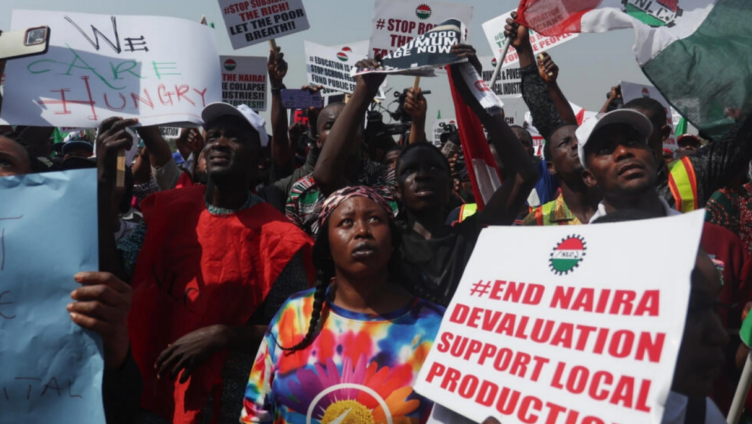Demonstrators hoped nationwide protests called by the Nigeria Labour Congress (NLC) umbrella union would pile pressure on the government, which brought in reforms last year that have had a devastating effect on citizens of Africa's biggest economy.
As inflation skyrockets, many poor Nigerians have had to skip meals and give up products such as meat, eggs and milk.
Over 1,000 demonstrators marched on the National Assembly in the capital Abuja, watched over by vigilante groups and armed police.
The protesters chanted and carried signs saying "Let the poor breathe" and "End naira devaluation".
"The government needs to wake up," said protester Roland Bamiche, who works for a hospitality union.
"People are dying, people are suffering, people are going through hell," the 45-year-old said. "The high cost of living is becoming unbearable."
Since coming to office last year President Bola Ahmed Tinubu has ended a fuel subsidy and currency controls, leading to a tripling of petrol prices and a spike in living costs as the naira has slid against the dollar.
The inflation rate reached a three-decade high of almost 30 percent in January, according to the national bureau of statistics.
Tinubu has called for patience to allow his reforms to take effect, saying they will help attract foreign investment, but the measures have hit Nigerians hard.
"Tinubu promised a change but now look where we are," said activist Aghedo Kehinde Stephen in Lagos where more than 1,000 people also turned out.
"There is no food and no security in the country."
'Reduced to beggars'
In the north, the economic crisis has forced people to eat poor-grade rice used as fish food.
To feed their children, women have even resorted to digging up anthills in search of grain stored by the insects, videos on social media show.
Hundreds of demonstrators marched to the governor's office in the northern city of Kano, the capital of a key state which also bears the same name.

"The population has been reduced to beggars. The government must take drastic measures," said protester Saudatu Ibrahim.
The government says it is working to address the crisis and on Tuesday Nigeria's central bank announced it was raising interest rates by four percentage points to 22.75 percent in a bid to tame inflation.
"We need prices to come down," said NLC worker Mercy Adeyemi at the Abuja demonstration.
The price of rice has more than doubled in the past year and the 48-year-old mother of four said she has been missing meals to make ends meet.
Protests have already taken place across the country this month and are set to continue tomorrow.
Latest Stories
-
Mike Lynch estate and business partner owe HP Enterprise £700m, court rules
9 minutes -
Trump administration pulls US out of UNESCO again
19 minutes -
WAFCON 2024: Ghana’s Black Queens miss out on final after penalty loss to Morocco
21 minutes -
Coca-Cola will roll out cane sugar Coke in US after Trump push
35 minutes -
Tourism Ministry inaugurates advisory board
45 minutes -
Wife of Diogo Jota posts ‘forever’ tribute
59 minutes -
Abuakwa South MP urges GNAT to lead Ghana’s EdTech revolution with a digital drive
1 hour -
Ghana’s actual public debt overstated by GH¢138bn – Auditor General
1 hour -
Abuakwa South MP demands pact to future-proof Ghana’s education
2 hours -
Leadership is quiet preparation, serve with integrity – Chief of Staff urges youth
2 hours -
Mother confesses to drowning 4-year-old son in well to please lover
2 hours -
Patricia Appiagyei rejects replacing Afenyo-Markin on ECOWAS Parliament delegation
2 hours -
Kevin Taylor’s court appearance without arrest proof of judicial abuse under NDC – NPP MP
2 hours -
The inconvenient truth: Why Africa’s boardrooms must reset the boardroom governance clock
3 hours -
Abuakwa South MP issues appeal for 21st-century overhaul of education system
3 hours

